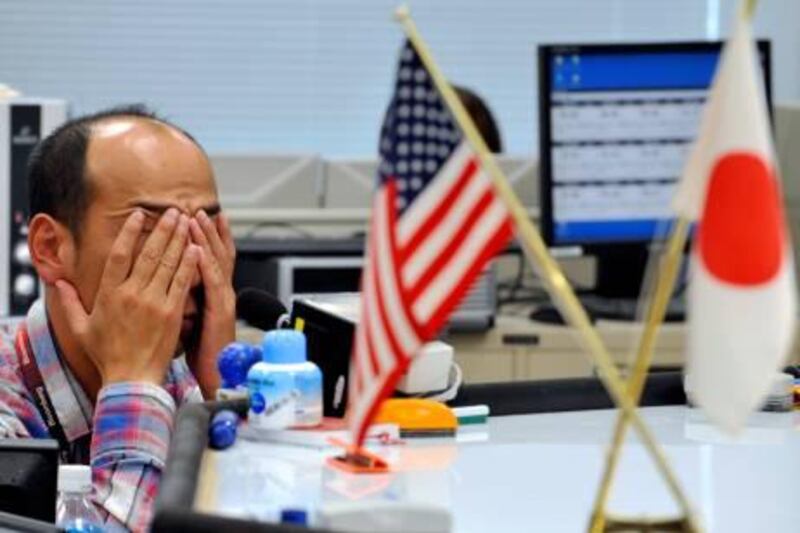Japan has taken a major step to recharge its flagging economic recovery, approving a stimulus package worth ¥4.85 trillion (Dh219.58 billion) to battle deflation and keep a lid on the strong yen.
The spending plan - the first in 11 years to be funded without the use of deficit-financing government bonds - is the latest step by the ruling Democratic Party of Japan to cope with the twin threats of a soaring yen and deflation, which threaten to derail the fragile economic recovery.
The package, which was yesterday approved by the cabinet, includes financial support for small businesses and spending to boost local economies. The government estimates it will help to lift the nation's GDP by 0.6 percentage points.
"This is an emergency economic package to deal with a rising yen and deflation," said Yoshihiko Noda, the finance minister. The extra budget is likely to be submitted to parliament this week for final approval.
The cabinet's approval came as the US dollar hovered near a 15-year low against the yen.
Mr Noda had warned the government would "act decisively" in markets if needed and expressed Tokyo's irritation with the yen's climb after the Group of 20 (G20) leading and emerging economies finance chiefs' meeting.
Mr Noda called this week's currency moves "one-sided" and said he was watching the market with "great interest" - language similar to that used by Tokyo in the build-up to last month's intervention. But he also said market conditions were not the same.
"When we intervened in September the yen was rising on its own. Since then various currencies, not just the yen, have been rising against the dollar," Mr Noda told parliament.
Investors took the G20's weekend agreement to shun competitive devaluations as a green light to resume selling the dollar, fuelled by expectations that the Federal Reserve will pump more money into the sputtering US economy.
The greenback stood at ¥80.69 in Tokyo yesterday after hitting a fresh 15-year low of ¥80.41 the previous day, nearing its post-Second World War low of ¥79.75 set in 1995.
A strong yen poses a major risk to Japan's export-led economy. It cuts the value of repatriated profits for Japanese exporters such as Toyota and Sony, and makes their products less competitive abroad.
Including Y238.8bn worth of public works contracts to be brought forward, the latest package by the government of Naoto Kan, the prime minister, amounts to ¥5.1tn.
Already given the green light by the cabinet this month, the stimulus measures include a ¥319.9bn outlay to create and protect jobs, ¥1.12tn for childcare, medical and nursing services, and Y3.07tn to help small businesses, revitalise regional economies and improve infrastructure.
The government will allocate ¥336.9bn to support growing business areas and technologies, including ¥87.2bn to help secure more sources of rare earth and other natural resources.
Japan's finance ministry has had little success in stemming the currency's surge despite engaging in ¥2.12tn worth of yen selling last month in its first currency-market intervention in more than six years.
The Bank of Japan has also not had much luck in its fight against entrenched deflation. This month the central bank loosened its already easy monetary policy by bringing back its near zero-interest rate policy and setting up a ¥5tn fund for private- and public-sector asset purchasing.
The stimulus package incorporates some of the proposals floated by opposition parties such as allocating funds to local governments for public works as Mr Kan tries to pass the budget bill through parliament, where his party has a majority in only the lower house.
"We put [the package] together by incorporating opinions and proposals from not only the ruling party but opposition parties," said Mr Noda.
"I believe the size and the measures [of the package] can bring us to an agreement."
Along with public works projects - the well-worn weapons of past governments to keep the economy afloat - the new spending plan is more aggressive in welfare and medical services.
The package also comes with government financial support for corporations investing overseas.
* with Reuters and Associated Press





